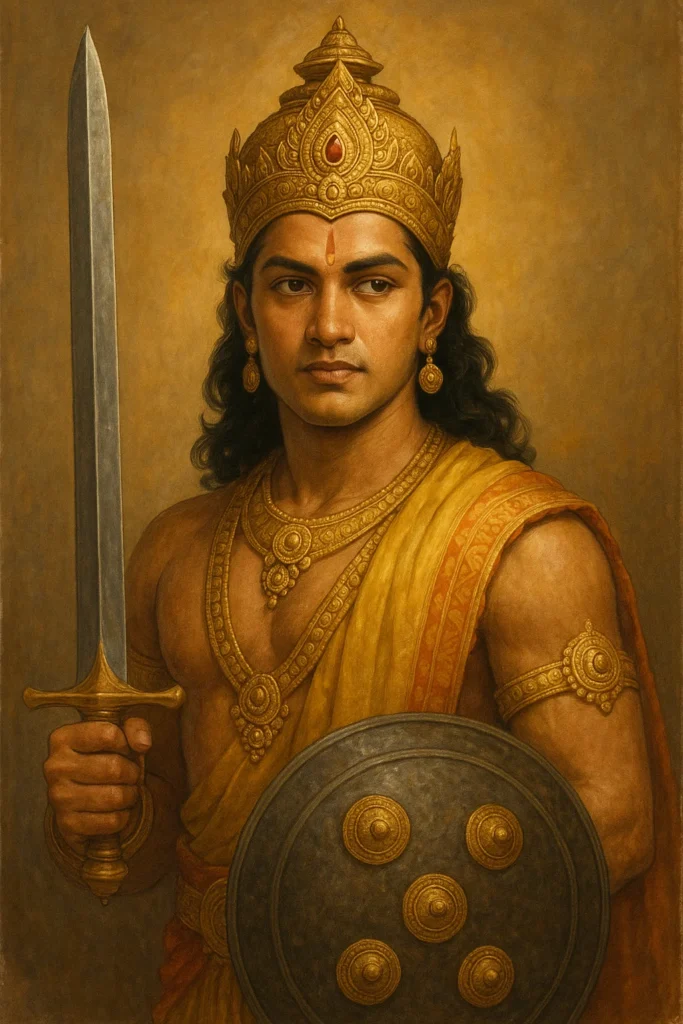When we think of the Mahabharata, most people recall Krishna’s wisdom, Arjuna’s valor, or Bheema’s strength. But hidden in the shadows of his more famous brothers, there was a Pandava who possessed unmatched intelligence, knowledge of astrology, and the power of silent wisdom—Sahadeva.
Sahadeva was more than just one of the Pandavas. He was a silent sage, a disciplined warrior, and a symbol of wisdom, humility, and devotion to Dharma. His character, though often understated, carries deep spiritual significance and valuable lessons for life.
In this blog post, we will explore everything about Sahadeva—the unsung hero of the Mahabharata. We will understand his role, his knowledge, his unique qualities, his battles, and, most importantly, his spiritual significance.
Who Was Sahadeva?
Sahadeva was the youngest of the Pandavas, born to Madri and the Ashwini Kumaras. Like his twin brother, Nakula, he was gifted with extraordinary beauty and intelligence. However, what made Sahadeva truly unique was his wisdom. He was a master of astrology, sword fighting, and the art of cattle management. His mind was as sharp as his sword, and his heart was as humble as his soul.
Despite knowing the future due to his astrological knowledge, Sahadeva never misused his gift. He remained bound by Dharma and followed the path of righteousness, even when it was difficult.
Sahadeva’s Knowledge – The Silent Knower of Truth
One of the most intriguing aspects of Sahadeva’s life is his deep knowledge of astrology. It is said that he knew the entire course of the Mahabharata before it even happened. He knew about the war, its outcome, and even Krishna’s divine plan. However, there was a twist—he was bound by an oath.
According to legend, when Sahadeva was young, he was blessed with divine wisdom. The gods, however, warned him that if he ever revealed what he knew, he would die instantly. Bound by this divine restriction, he remained silent despite knowing all that was to come.
This is an important lesson for us. Often in life, we may know certain truths, but not every truth is meant to be spoken. Wisdom is not just about knowing—it is about understanding when and how to use that knowledge.
There is a Sanskrit saying, “Vidya dadaati vinayam”—true knowledge brings humility. Sahadeva was the perfect example of this.

Sahadeva’s Role in the Kurukshetra War
Although Sahadeva was not as celebrated as Arjuna or Bheema, his contribution to the war was immense. He was a skilled swordsman and played a crucial role in several battles.
1. Defeating Shakuni – The Master of Deception
One of Sahadeva’s most important achievements was killing Shakuni, the mastermind behind the infamous game of dice. Shakuni’s deception had caused immense suffering to the Pandavas, leading them to exile and humiliation. When the war finally came, it was Sahadeva who avenged their dishonor by slaying Shakuni in battle.
This battle was not just about revenge. It symbolized the triumph of truth over deception. In life, we often encounter manipulative people, but just like Sahadeva, patience and righteousness ultimately lead to justice.
2. Strategic Role in the War
Sahadeva was not only a warrior but also a strategist. He played a vital role in advising the Pandavas on the positioning of their troops and predicting favorable times for battle using his astrological expertise. His silent contributions were as powerful as any sword strike.

Sahadeva’s Devotion to Krishna
Sahadeva was deeply devoted to Lord Krishna. Despite knowing Krishna’s divine nature, he never displayed arrogance about his knowledge. Instead, he remained humble and served Krishna with pure devotion.
One of the most touching incidents from the Mahabharata is when Krishna approaches Sahadeva before the war and asks him when the Pandavas should begin the battle. Knowing that Krishna was the Supreme Being, Sahadeva immediately folded his hands and said, “O Lord, whenever you say is the right time.” This shows his deep faith and surrender to the divine.
In spirituality, surrender is one of the highest forms of devotion. Sahadeva teaches us that when we surrender to the divine with complete trust, life unfolds exactly as it should.
Spiritual Lessons from Sahadeva
1. Knowledge is a Responsibility
Sahadeva knew the future but never misused his wisdom. In today’s world, where knowledge is easily accessible, it is important to remember that wisdom should be used for good and not for personal gain.
2. Patience and Dharma Always Win
Despite facing hardships, Sahadeva never strayed from the path of Dharma. In life, patience and righteousness may seem difficult, but they always lead to ultimate victory.
3. True Strength is Silent
Sahadeva was powerful, but he never boasted about it. He silently contributed, fought, and supported his brothers. This teaches us that true strength does not need validation—it simply exists and acts when needed.
4. Surrender to the Divine
Sahadeva’s unwavering faith in Krishna reminds us that life is best lived when we surrender to the higher power. Control is an illusion, and real peace comes from trust in the divine plan.
Why Sahadeva’s Story Matters Today
In today’s fast-paced world, we often equate success with loud achievements and external validation. But Sahadeva teaches us that silent, consistent efforts are just as important. Knowledge should be accompanied by humility, and true wisdom lies in understanding when to speak and when to remain silent.
Sahadeva was not just a warrior of the Mahabharata—he was a warrior of wisdom, patience, and devotion. His life serves as a guide for all of us, reminding us that success is not about fame but about integrity, humility, and the ability to walk the path of Dharma.
Conclusion
Sahadeva may not be the first name that comes to mind when we think of the Pandavas, but his story is one of silent strength, wisdom, and devotion. His knowledge, discipline, and faith make him an unsung hero of the Mahabharata and a timeless example of spiritual wisdom.
In the end, Sahadeva’s journey is a reminder that life is not about knowing everything—it’s about knowing how to live with what we know. May we all find the wisdom, patience, and devotion that Sahadeva embodied, and may we walk our paths with silent strength and unwavering faith in the divine.

